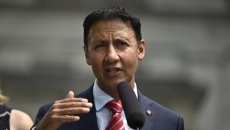Inflation finally hit the Bank of Canada's two per cent target in August after a tumultuous battle with skyrocketing price growth, raising the odds of larger interest rate cuts in the coming months.
Canada's annual inflation rate fell from 2.5 per cent in July to reach the lowest level since February 2021.
The slowdown can be attributed in part to lower gasoline prices, Statistics Canada said Tuesday in its consumer price index report.
Clothing and footwear prices also decreased on a month-over-month basis. It marked the first decline in the month of August since 1971 as retailers offered larger discounts to entice shoppers amid slowing demand.
CIBC senior economist Andrew Grantham says the latest data suggests inflation is no longer threatening and the Bank of Canada should focus on stimulating the economy again.
"I'm already worried that the economy is a little weaker than it really needed to be to get inflation down to two per cent," Grantham said.
The marked slowdown in price growth last month was steeper than the 2.1 per cent annual increase forecasters were expecting ahead of Tuesday’s release and will likely spark speculation of a larger interest rate cut next month from the Bank of Canada.
Grantham noted that excluding mortgage interest costs — which have been driven up by high interest rates — the annual inflation rate was only 1.2 per cent last month.
The Bank of Canada’s preferred core measures of inflation, which strip out volatility in prices, also edged down in August.
Benjamin Reitzes, managing director of Canadian rates and macro strategist at BMO, said Tuesday's figures "tilt the scales" slightly in favour of more aggressive cuts, though he noted the Bank of Canada will have one more inflation reading before its October rate announcement.
"If we get another big downside surprise, calls for a 50 basis-point cut will only grow louder," wrote Reitzes in a client note.
Governor Tiff Macklem recently signalled that the central bank is ready to increase the size of its interest rate cuts, if inflation or the economy slow by more than expected.
"With inflation getting closer to the target, we need to increasingly guard against the risk that the economy is too weak and inflation falls too much," Macklem said after announcing a rate cut on Sept. 4.
The Canadian economy has slowed significantly under the weight of high interest rates, leading to a declining real gross domestic product on a per person basis.
The unemployment rate has also been steadily climbing for the last year and a half, reaching 6.6 per cent in August.
Macklem has emphasized that the inflation target is symmetrical — meaning the Bank of Canada is just as concerned with inflation falling below target as it is with it rising above the benchmark.
The central began rapidly hiking interest rates in March 2022 in response to runaway inflation, which peaked at a whopping 8.1 per cent that summer.
The Bank of Canada increased its key lending rate to five per cent and held it at that level until June 2024, when it delivered its first rate cut in four years.
A combination of recovered global supply chains and high interest rates have helped cool price growth in Canada and around the world.
CIBC is forecasting the central bank will cut its key rate by two percentage points between now and the middle of next year.
The Bank of Canada's key rate currently stands at 4.25 per cent.
The U.S. Federal Reserve is also expected on Wednesday to deliver its first interest rate cut in four years.






